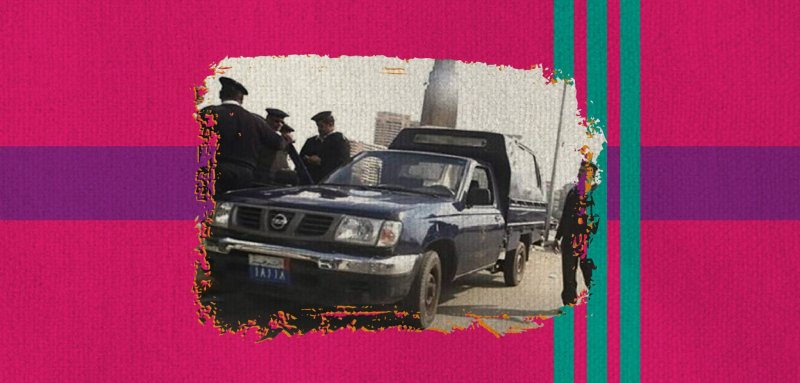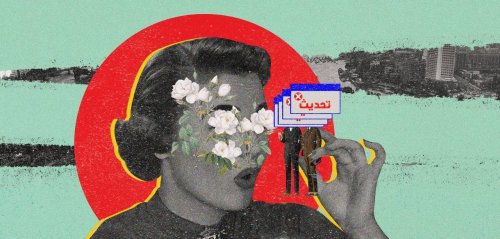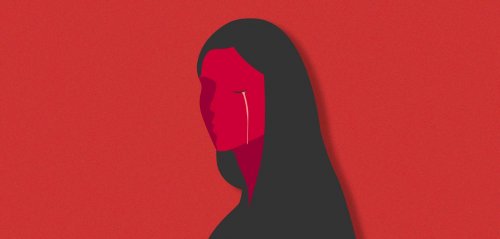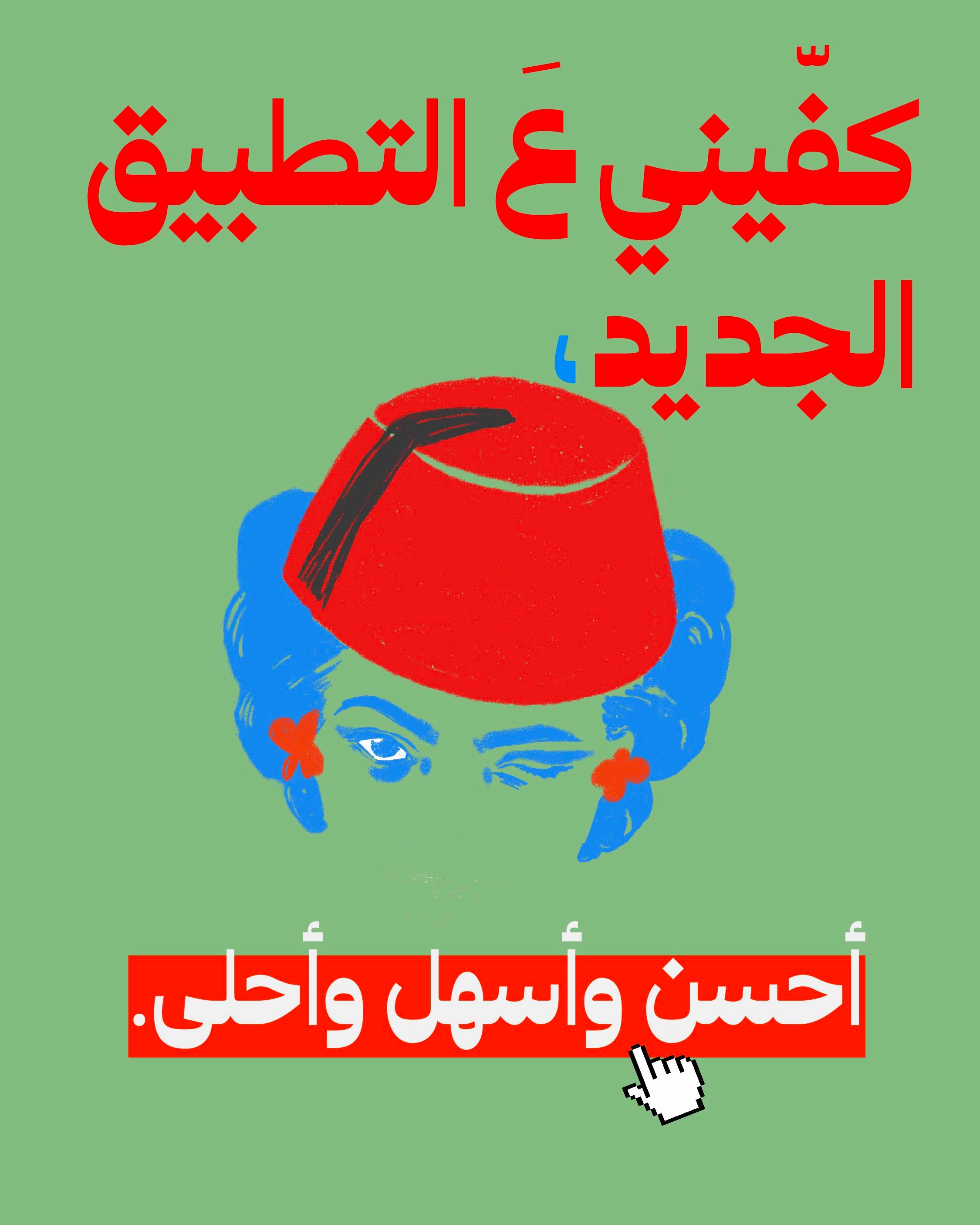“I was verbally harassed by a driver, and I called the police after I filmed the harasser. He tried to escape, but I stopped him. On the way to the police station, they forced me to ride inside a ‘box’ car next to the harasser. One of them began talking to me and I don't know his rank because he was wearing civilian clothes, and he said to me: 'If you file a report, you will stay in the station overnight'.”
This is what happened with Maryam Samir, a student at the Faculty of Engineering, in 2022. As for the rest of her story, she tells Raseef22, “Following a long series of brotherly advice to not file a (police) report, he accused me of being stubborn, and as soon as we arrived, I found all the police officers advising me to leave and just be satisfied with the fear and horror the harasser has experienced so far!”
She continues, “After exchanging cigarettes between the offender and the officers, the policemen suddenly turned against me and they kicked my sister out of the station, handed her my bag and phone, and addressed me by saying: 'We have been talking to you for hours, we do not work for you, if you are 'queer', we will write up a report against you and throw you in detention. You are still a young girl. A harassment report will ruin your reputation.”
Maryam, who filed a report under No. 4,291, at the Mansoura Police Station, was suddenly turned into an accused suspect. She says, “After many hours had passed, I was surprised that a report was filed against me accusing me of insulting, swearing, and slandering. And at dawn I had to abandon my report and go back home defeated”.
Reports to discredit women
Many girls and women are harassed when they go to file reports or even initiate litigation proceedings because those in law enforcement have a cultural background that tends to discriminate against women and discredit them.
When S. H., a 40 year old housewife, went to the police station after she and her children were subjected to physical violence at the hands of her husband and his brothers because she had asked for a divorce, she thought that this authority entrusted with protecting citizens would protect her, and even serve her justice. But things went the opposite of what she had wanted.
“I thought that filing a report to have him not harm me would end this fear, and that it would be a document that would help me file for divorce,” she tells Raseef22, "but inside the department, they summoned my husband and his brothers, and because he is the imam of a mosque in the village, they sympathized with him. And then the situation turned against me and I suddenly became a wife with bad behavior. The police officers began to wonder: 'Why did the husband have to beat her? And why is she asking for a divorce? Does she want to follow a wicked path? In the end, the report was not written and I received threats and heard insulting phrases from the officers despite my children testifying in my favor.”
F. S., a 28 year old journalist, is yet another witness to the negativity that women are met with in police stations. The young woman was harassed and physically assaulted inside the metro. She filed a report accompanied by witnesses to the incident, and the perpetrator confessed to the crime, and a human rights center had even assigned a lawyer to defend her, but...
F. recounts that, “The lawyer happened to be a Christian. He told me that I must attend the investigations in gloomy clothes, wearing long sleeves, and sporting unstyled hair, and he said to me sarcastically: 'You are a Christian and your luck is that the lawyer is a Christian. The prosecutor will throw us in jail and will sympathize with the harasser and find an excuse for him because you are not veiled and therefore you wear make up and dress up.”
The young woman reluctantly followed the advice of the lawyer in her clothing, "but despite the presence of witnesses to the incident that had evolved from harassment to beating and assault, a six-month suspended prison sentence was issued in Case No. 5,932 of 2013, Qasr al-Nil Misdemeanor Court."
There is no safe place for women in Egypt. Khadija Shams, 23, was verbally and physically harassed by a dermatologist in May 2022. So she went to the police station to file a report against him, and there, “I found the officer taunting me and treating me mockingly because a doctor has his reputation, so how would he risk it to touch my body? Then he asked me questions like: Do you have any previous problems or personal differences between you? In the end, he claimed that the report could only be drawn up if the accused was present.”
This reality is known to all those who are interested in women’s conditions and rights issues in Egypt. State institutions know it as well, and have made official efforts to change it, but the law enforcement process sometimes is impeded by the fact that those in charge come from a societal culture that tends to discriminate against women, especially in cases of harassment and domestic violence.
"They forced me to ride inside a ‘box’ car next to the harasser. One of them began talking to me and I don't know his rank because he was wearing civilian clothes, and he said to me: 'If you file a report, you will stay in the station overnight'.”
Therefore, in the context of declaring 2017 as the 'Year of (Egyptian) Women', an official training workshop was launched targeting policemen, prosecutors, and judges dealing with women in cases of violence and harassment, in order to provide service in a legal manner, and separate it from popular and patriarchal culture, which may be more inclined to blame women for men's mistakes, whether in cases of harassment or in familial and marital violence, and even in cases of marital rape, which so far have been difficult to accept by many, because a marital relationship allows sex regardless of the wife's desire, and just because the husband has needs.
Trainings for relevant bodies and agencies
Speaking on these trainings, Noura Mohamed, manager of a programme aimed at combating violence against women at the Center For Egyptian Women's Legal Assistance (CEWLA) — a non-governmental organization that seeks to push for a legal system that guarantees equality and human rights for all — says that the trainings came following many years of demands to improve the performance of the bodies concerned with the protection of women. This would be done by spreading human rights awareness in them, especially in police stations, and appointing female officers to deal with cases of violence, such as incidents of harassment or violence that women may find very uncomfortable to talk about in front of a man, at a time when the details of what she says will affect the judicial process (and outcome), as well as by providing psychologists and specialitsts within police stations “because in some cases, the woman may go in an unstable psychological state and would be unable to concentrate, especially in cases of domestic violence and sexual assault.”
Since 2015, several laws and decisions have been issued aimed at developing the system of women's rights and protecting them in Egypt, including harsher penalties in: incidents of sexual harassment (2016), crimes of female genital mutilation (2021), cases of withholding inheritance from all those who have the right to it (2017), and when confronting those evading alimony or are reluctant to pay (2020). The also require not disclosing the data of victims in crimes of harassment, violence, indecent assault, and moral corruption (2020), allocating a quota of no less than 25% of parliamentary seats to be reserved for women (2020), and allocating at least 10% of Senate seats to be reserved for women (2020).
In this regard, Counselor Mohamed Samir, the spokesperson for the Administrative Prosecution, points out that the enactment of laws alone is not a guarantee for the implementation of justice, but rather “a mechanism is necessary to enforce legislation”, hence came “the idea of training men of the executive authority (represented by the police), and men of the judiciary (represented by prosecutors and judges).”
He points out that how the police report of the incident is drafted, may turn the assault from a misdemeanour to a felony, which emphasizes the importance of training those who deal with reports of violence against women in general, whether the recipients of reports are within police stations, or those in the prosecution, as well as eliminating complaints and cases based on gender-based targeting.
The law enforcement process sometimes is impeded by the fact that those in charge come from a societal culture that tends to discriminate against women, especially in cases of harassment and domestic violence
In 2017, these trainings actually began, "with the signing of an agreement between the National Council for Women (NCW), the Center for Judicial Studies, and the concerned law enforcement authorities, represented by the Ministries of Interior and Justice," Samir tells Raseef22, and "the role of the National Council for Women was to provide trainers in this field from judges with a long history in gender and family issues and Egyptian specialists. The Center for Judicial Studies also provided logistics, including training halls and tools."
“The first harvest,” as he put it, was the emergence of a movement from within the police to appoint female law graduates and officers in police stations to receive women's complaints and write down reports for them. He adds that the year 2021 witnessed the appointment of female members of the public prosecution office and female judges, which will provide an opportunity for the Ministry of Justice to form a unit or department within the prosecution and courts specialized in violence against women, "like we did in the past and established family courts".
Samir points out that "training men to deal sensitively with gender issues may make men deal more fairly with abused women," and that "the goal is to create a state of awareness and sensitivity towards gender issues."
He calls on every woman who has been subjected to violence or illegal treatment by law enforcement — whether in police stations, prosecutions, and courts — to file a complaint, and "these complaints will be actually looked into and reviewed, and anyone who commits a mistake or crime will be held accountable."
What has been achieved?
Lana Abu Nahid, the director of the training project for judiciary and police officers at the National Council for Women (NCW), explains to Raseef22 how "the council, through its complaints unit, has become aware of the problems that women face, whether during the filing or drafting of a police report, or during the stages of litigation, starting with dealing in a violent or misogynistic way, or even in lengthening the proceedings, which is what we focused on during the training."
She adds that the training provided by "judicial, legal, and human rights Egyptian men" includes an introduction to women's rights, the laws related to them, and international conventions on human, women, and children's rights. As for the judges, "we focus on introducing articles against violence and its forms, as well as human trafficking and all the latest developments in the laws at the local and international levels."
A report issued in April 2021 on the “National Strategy to Eliminate Violence against Women (2015-2020)” — which is the strategy from which the idea of the trainings emerged — explains that the total number of trainees until then had reached 5,150 male and female trainees, including 140 police officers, 400 male anf female family prosecutors, 509 public prosecutors, 611 male judges, 66 female judges, and 127 members of the Administrative Prosecution Authority.
The enactment of laws alone is not a guarantee for the implementation of justice, but rather a mechanism is necessary to enforce legislation... What has the training of policemen, prosecutors, and judges produced on how to deal with women victims of violence in Egypt produced?
He also points out the issuance of six guidelines to enhance the skills of those in the service in dealing with violence against women, including a manual and a pocket booklet for policemen under the name, "An Effective Police Response to Crimes of Violence against Women", a manual for prosecutors called, "Effective judicial response to crimes of violence against women", and a manual for standards and regulations for judges.
The report also included information on the establishment of a department for combating violence against women in the Ministry of the Interior, followed by branches in security directorates and police stations in all governorates, with a hotline linked to the ministry's 'department of violence against women', along with the presence of policemen who have received training in each unit.
Limited Training
Noura Mohamed sees that these trainings "may have achieved some qualitative results, but they are still limited because they are centralized and only target the capital Cairo, while other regions, villages, and Upper Egypt in the south have not witnessed this development, which means that the problem has not been solved yet, because those areas are the most vulnerable to violence, harassment, and assaults of all kinds, with more widespread cases of early marriage and genital mutilation (circumcision).”
Mohamed indicates “the need to intensify efforts to develop performance to reach the best results, and we hope that there will be greater coordination and networking with non-governmental civil institutions, and this is the missing piece, especially since the contribution of the civil society in the trainings will be more realistic because we have practical experiences on the ground ... or at least the recommendations we make would be taken into account.”
This limitation is recognized by Samir Mohamed. He says, "The downside of the training is that it is centralized in Cairo only, with a rate of about 99%, while the regions remain poor due to the high costs, including transportation, accommodation, and providing places for training."
He goes on to say, "We had hoped to target all the men of the executive and judicial authorities, but the financial cost is very high."
Despite these trainings, Nivine Obaid, a researcher and activist in gender issues at the New Woman Foundation, asserts that "we still see that prosecutors and those responsible for writing up and drafting reports in police stations play the role of a guardian of the morals of the modern Egyptian family. Some judges still say to women who have been subjected to physical or verbal violence: 'Keep your family whole, my child.' We have seen a little bit of progress, but it's a good start.”
The same assessment is repeated by Yasser Saád, a lawyer in the Legal Support Unit at the New Women Foundation. He tells Raseef22, “In practice, the trainings have resulted in progress that we do not deny, but it is not based on scientific foundations, and the matter is still subject to the personalities of those in the investigative and inference authorities. Therefore the only option is for all institutions to join hands to produce a real training programme based on interaction and experience, and we also hope to provide specialized courts in gender-based violence, and to provide training for its personnel."
رصيف22 منظمة غير ربحية. الأموال التي نجمعها من ناس رصيف، والتمويل المؤسسي، يذهبان مباشرةً إلى دعم عملنا الصحافي. نحن لا نحصل على تمويل من الشركات الكبرى، أو تمويل سياسي، ولا ننشر محتوى مدفوعاً.
لدعم صحافتنا المعنية بالشأن العام أولاً، ولتبقى صفحاتنا متاحةً لكل القرّاء، انقر هنا.






